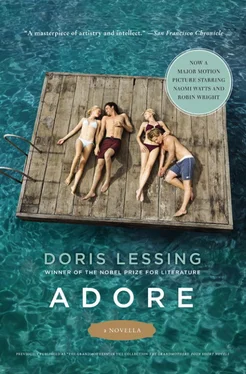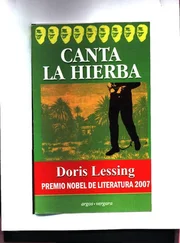She is reading slowly, mouthing the words. It looks a difficult book. This is a young woman with two little children clutching at her legs. She is pregnant. The Indian is distressed, because the young woman’s headscarf, which should be white, is yellow with dust. Dust lies between her breasts and on her arms. This man is distressed because of the lines of people, all thirsty. He doesn’t have enough water for them. He is angry because he knows there are people dying out there, beyond the dust clouds. His older brother had been here holding the fort, but he had said he needed a break, had gone into town, really rather ill, because of the drought.
This man is curious. He says to the young woman, “What are you reading?”
“It is about Russia,” says the girl.
“Do you know where Russia is?” He hardly knows himself.
The young woman looks straight at him, full of dignity, though her eyes are red from dust. “I was best in the class. My teacher said I was best.”
The young woman resumes her reading. She wants to get to the end of the paragraph.
The Indian looks at the two little children and reaches for some Fanta, but the mother says, “Fanta makes them thirstier.”
The Indian knows he shouldn’t do this, but he reaches down to a great plastic container beside him, behind the counter, and pours out two mugs of water, which he hands to the children. He watches while the girl looks at her children drinking, her mouth moving. He gives her a mug of water. It hurts him to see her drinking it, so painfully thirsty is she.
Now she hands him her own plastic water container, which he fills. The young woman and the children watch him closely so that he doesn’t spill any.
She is bending again over the book. She reads slowly. The paragraph fascinates her and she reads it again.
Varenka, with her white kerchief over her black hair, surrounded by the children and gaily and good-humouredly busy with them, and at the same visibly excited at the possibility of an offer of marriage from a man she cared for, looked very attractive. Koznyshev walked by her side and kept casting admiring glances at her. Looking at her, he recalled all the delightful things he had heard from her lips, all the good he knew about her, and became more and more conscious that the feeling he had for her was something rare, something he had felt but once before, long, long ago, in his early youth. The joy of being near her increased step by step, and at last reached such a point that, as he put a huge birch mushroom with a slender stalk and up-curling top into her basket, he looked into her eyes and, noting the flush of glad and frightened agitation that suffused her face, he was confused himself, and in silence gave her a smile that said too much.
This lump of print is lying on the counter, together with some old copies of magazines, some pages of newspapers with pictures of girls in bikinis.
It is time for the woman to leave the haven of the Indian store and set off back along the four miles to her village. Outside, the lines of waiting women clamor and complain. But still the Indian lingers. He knows what it will cost this girl—going back home, with the two clinging children. He would give her the piece of prose that so fascinates her, but he cannot really believe this splinter of a girl with her great belly can really understand it.
Why is perhaps a third of Anna Karenin here on this counter in a remote Indian store? It is like this.
A certain high official, from the United Nations as it happens, bought a copy of this novel in a bookshop before he set out on his journey to cross several oceans and seas. On the plane, settled in his business class seat, he tore the book into three parts. He looked around his fellow passengers as he did this, knowing he would see looks of shock, curiosity, but some of amusement. When he was settled, his seat belt tight, he said aloud to whomever could hear, “I always do this when I’ve a long trip. You don’t want to have to hold up some heavy great book.” The novel was a paperback, but, true, it is a long book. This man is well used to people listening when he spoke. “I always do this, traveling,” he confided. “Traveling at all these days, is hard enough.” And as soon as people were settling down, he opened his part of Anna Karenin , and read. When people looked his way, curiously or not, he confided in them. “No, it really is the only way to travel.” He knew the novel, liked it, and this original mode of reading did add spice to what was after all a well-known book.
When he reached the end of a section of the book, he called the air hostess, and sent the chapters back to his secretary, traveling in the cheaper seats. This caused much interest, condemnation, certainly curiosity, every time a section of the great Russian novel arrived, mutilated but readable, in the back part of the plane. Altogether, this clever way of reading Anna Karenin makes an impression, and probably no one there would forget it.
Meanwhile, in the Indian store, the young woman is holding on to the counter, her little children clinging to her skirts. She wears jeans, since she is a modern woman, but over them she has put on the heavy woolen skirt, part of the traditional dress of her people: her children can easily cling onto its thick folds.
She sends a thankful look to the Indian, whom she knew liked her and was sorry for her, and she steps out into the blowing clouds.
The children are past crying, and their throats are full of dust.
This was hard, oh yes, it was hard, this stepping, one foot after another, through the dust that lay in soft deceiving mounds under her feet. Hard, but she was used to hardship, was she not? Her mind was on the story she had been reading. She was thinking, She is just like me, in her white headscarf, and she is looking after children too. I could be her, that Russian girl. And the man there, he loves her and will ask her to marry him. She had not finished more than that one paragraph. Yes, she thinks, a man will come for me and take me away from all this, take me and the children, yes, he will love me and look after me.
She steps on. The can of water is heavy on her shoulders. On she goes. The children can hear the water slopping about. Halfway she stops, sets down the can.
Her children are whimpering and touching it. She thinks that she cannot open it, because dust would blow in. There is no way she can open the can until she gets home.
“Wait,” she tells her children, “wait.”
She has to pull herself together and go on.
She thinks, My teacher said there is a library, bigger than the supermarket, a big building and it is full of books. The young woman is smiling as she moves on, the dust blowing in her face. I am clever, she thinks. Teacher said I am clever. The cleverest in the school—she said I was. My children will be clever, like me. I will take them to the library, the place full of books, and they will go to school, and they will be teachers—my teacher told me I could be a teacher. My children will live far from here, earning money. They will live near the big library and enjoy a good life.
You may ask how that piece of the Russian novel ever ended up on that counter in the Indian store?
It would make a pretty story. Perhaps someone will tell it.
On goes that poor girl, held upright by thoughts of the water she will give her children once home, and drink a little of herself. On she goes, through the dreaded dusts of an African drought.
We are a jaded lot, we in our threatened world. We are good for irony and even cynicism. Some words and ideas we hardly use, so worn out have they become. But we may want to restore some words that have lost their potency.
We have a treasure-house of literature, going back to the Egyptians, the Greeks, the Romans. It is all there, this wealth of literature, to be discovered again and again by whoever is lucky enough to come upon it. A treasure. Suppose it did not exist. How impoverished, how empty we would be.
Читать дальше
Конец ознакомительного отрывка
Купить книгу











